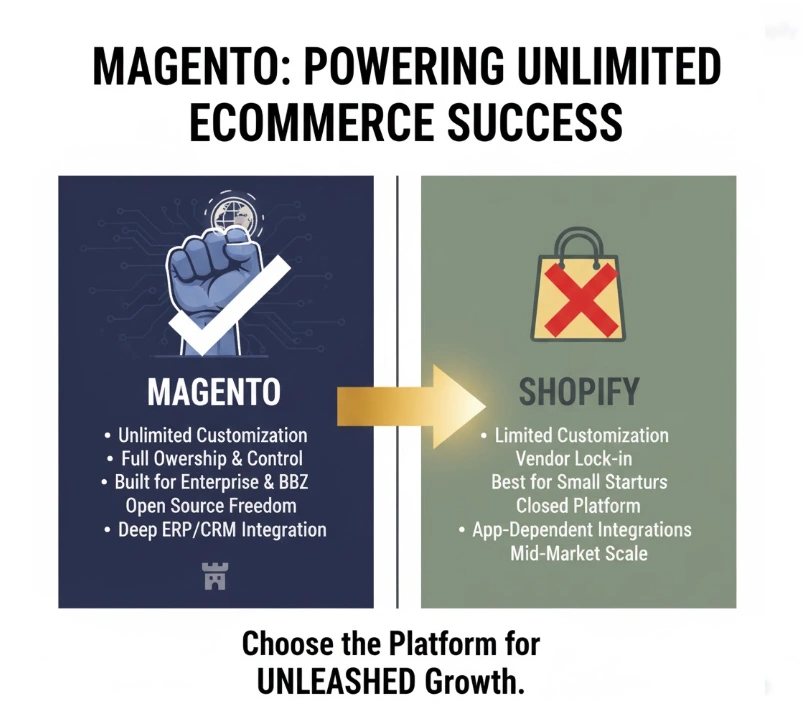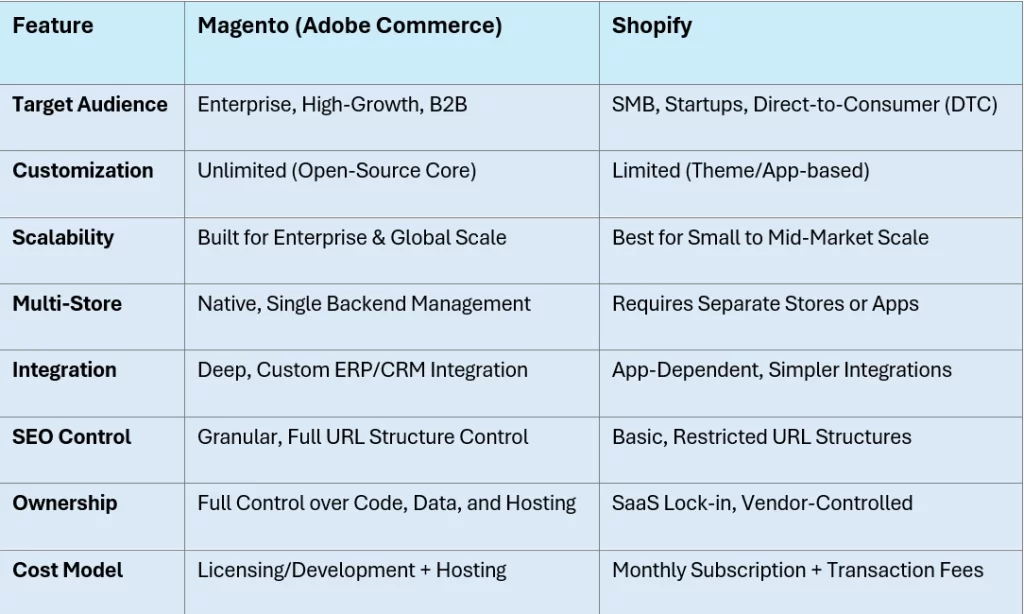Choosing the Right Platform for Long-Term Success
In the world of eCommerce, selecting the right platform is the most critical decision a business will make. While Shopify has established itself as the go-to solution for beginners and small-to-medium businesses (SMBs) due to its simplicity and ease of use, Magento (Adobe Commerce) remains the superior choice for enterprises demanding unlimited flexibility, massive scalability, and deep, future-proof customisation.
This analysis is designed to help established businesses and those with aggressive growth strategies understand why Magento, particularly the enterprise-grade Adobe Commerce, provides the foundational control necessary for complex, high-volume operations.

Why Magento (Adobe Commerce) is the Enterprise Standard
The fundamental difference between the two platforms lies in their architecture and intended audience. Shopify is a Software-as-a-Service (SaaS) solution built for speed and simplicity, whereas Magento is an open-source platform (with Adobe Commerce as the fully supported enterprise version) built for power and adaptability.
Here is a detailed breakdown of the critical areas where Magento’s architecture provides a distinct advantage for enterprise-level growth:
1. Customisation and Architectural Flexibility
Magento’s open-source nature grants developers complete access to the core code. This means the platform can be fully tailored to meet unique business logic, integrate with proprietary systems, and support highly specialized customer experiences that are simply not possible on a closed platform.
- Magento/Adobe Commerce: Offers unlimited customization. Businesses can build unique features, optimize checkout flows, and implement complex multi-site architectures without vendor restrictions.
- Shopify: As a closed-source, proprietary platform, customization is limited to themes, apps, and front-end scripting. Businesses are constrained by Shopify’s core architecture, often leading to compromises on advanced requirements.
2. Scalability for High-Volume and Complex Catalogs
For businesses handling thousands of SKUs, complex product configurations, and high traffic spikes, scalability is non-negotiable. Magento is engineered to handle these demands.
- Magento/Adobe Commerce: Designed for enterprise-level performance. It can manage massive product catalogs, support multi-warehouse inventory, and maintain speed under extreme traffic loads, making it ideal for global expansion.
- Shopify: While capable, it can begin to struggle with the complexity of advanced product types (e.g., custom options, bundles) or the sheer volume of data required by large, international operations. It is best suited for mid-market scale.
3. Advanced Native Features and B2B Functionality
Magento offers a suite of advanced features out-of-the-box that are essential for sophisticated eCommerce operations, reducing the reliance on third-party extensions.
- Magento/Adobe Commerce: Includes native support for multi-store management (running multiple brands/regions from a single backend), advanced pricing rules, and robust B2B functionality (e.g., custom catalogs, negotiated pricing, quick order forms).
- Shopify: Achieving similar functionality often requires stacking multiple third-party apps, which increases licensing costs, introduces potential compatibility issues, and complicates maintenance.
4. Integration and Ecosystem Control
Enterprise businesses rely on seamless data flow between their eCommerce platform and core business systems like ERP (Enterprise Resource Planning) and CRM (Customer Relationship Management).
- Magento/Adobe Commerce: Provides a flexible API and architecture that facilitates deep, custom integration with any existing or future business system, ensuring a unified operational backbone.
- Shopify: Its ecosystem is heavily app-driven. While convenient for simple integrations, complex, two-way data synchronization with legacy or proprietary ERP/CRM systems can be challenging and often requires expensive, custom middleware.
5. SEO and Marketing Granularity
Search engine optimization (SEO) is a primary driver of organic traffic and revenue. Magento offers the granular control required for fine-tuning performance.
- Magento/Adobe Commerce: Offers granular SEO control, including customizable URL structures, full control over robots.txt, advanced schema markup implementation, and detailed metadata management.
- Shopify: Its SEO capabilities are more basic and rigid, particularly concerning URL structures (e.g., mandatory /products/ in URLs), which can limit advanced optimization strategies.
Comprehensive Platform Comparison

Conclusion: Aligning Platform with Business Ambition
The choice between Magento and Shopify is not about which platform is “better” in a vacuum, but which platform is the best fit for your business’s ambition and complexity.
If your primary need is to launch quickly, manage a simple product line, and prioritize low initial overhead, Shopify is an excellent, user-friendly solution.
However, if your business requires:
- Complex B2B or B2C logic.
- Integration with proprietary or legacy systems.
- Unrestricted design and feature customisation.
- A foundation for aggressive, long-term, international growth.
Then Magento (Adobe Commerce) is the superior, future-proof choice. It empowers businesses to build a truly customized, scalable, and controlled eCommerce ecosystem that evolves with market demands, rather than being constrained by a vendor’s roadmap.
Note: This content is based on general platform capabilities and is intended for informational purposes. Specific requirements should be discussed with a qualified eCommerce development partner.
